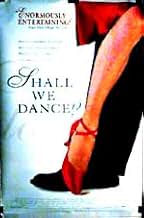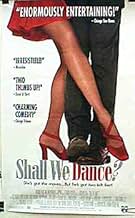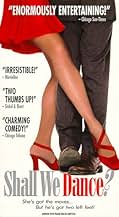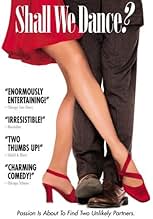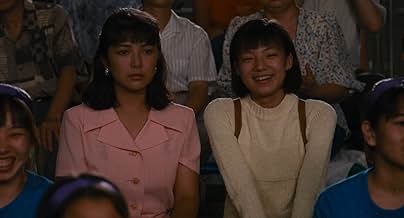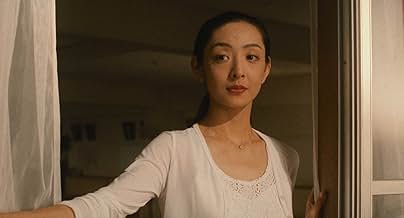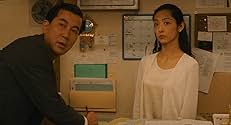IMDb-BEWERTUNG
7,7/10
12.166
IHRE BEWERTUNG
Füge eine Handlung in deiner Sprache hinzuA successful but unhappy Japanese accountant finds the missing passion in his life when he begins to secretly take ballroom dance lessons.A successful but unhappy Japanese accountant finds the missing passion in his life when he begins to secretly take ballroom dance lessons.A successful but unhappy Japanese accountant finds the missing passion in his life when he begins to secretly take ballroom dance lessons.
- Auszeichnungen
- 55 Gewinne & 7 Nominierungen insgesamt
Eri Watanabe
- Toyoko Takahashi
- (as Eriko Watanabe)
Reiko Kusamura
- Tamako Tamura
- (as Raiko Kusamura)
Empfohlene Bewertungen
Watched this last night and was bowled over by the heartfelt story line, the excellent character development, and the good karmic vibe emanating from the acting and movie as a whole.
Without giving away too much of the plot, it begins with an ordinary joe who commutes to his office job every day who becomes inspired to take dance lessons. Along the way the protagonist and the assorted characters he meets in his quest to be smooth on the dance floor learn lessons about others and about themselves.
The story has a prologue about what dancing in Japan symbolizes sociologically, so it isn't exactly as simple to learn to dance in Japan as it is here in the U.S.
The film is lighthearted; you'll laugh out loud at some of the sight gags. Yet it is also dignified in a way hard to describe. All of the film's characters are taken seriously, as they are, and none are diminished because of their "imperfections."
I've been thinking about taking social dance classes with some friends. It just so happened a friend lent me the video on learning to dance. Is this synchronous or what? I think so because now I'm really geeked to give it a try.
Watch this wonderful family film (small children might not get it, but teens certainly would) and smile at the genuine caring you see shown in it time and again.
Why they would make a remake of Shall We Dance is a mystery, as it is perfect as-is.
Without giving away too much of the plot, it begins with an ordinary joe who commutes to his office job every day who becomes inspired to take dance lessons. Along the way the protagonist and the assorted characters he meets in his quest to be smooth on the dance floor learn lessons about others and about themselves.
The story has a prologue about what dancing in Japan symbolizes sociologically, so it isn't exactly as simple to learn to dance in Japan as it is here in the U.S.
The film is lighthearted; you'll laugh out loud at some of the sight gags. Yet it is also dignified in a way hard to describe. All of the film's characters are taken seriously, as they are, and none are diminished because of their "imperfections."
I've been thinking about taking social dance classes with some friends. It just so happened a friend lent me the video on learning to dance. Is this synchronous or what? I think so because now I'm really geeked to give it a try.
Watch this wonderful family film (small children might not get it, but teens certainly would) and smile at the genuine caring you see shown in it time and again.
Why they would make a remake of Shall We Dance is a mystery, as it is perfect as-is.
Shohei Sugiyama is a dispirited salaryman who has lost his lust for life. Despite having a wife and daughter, a nice house and a steady job, depression grips him. One day, while riding the train home, he spots a beautiful, forlorn looking woman-Mai Kishikawa- gazing out the window of a dance studio. Although not really interested in dance, Sugiyama plucks up enough courage to take lessons in the studio, in order to get to know her. Under the tuition of the elderly Tamako Tamura, however, he begins to fall in love with dancing, finding meaning in his life once more.
Written and directed by Masayuki Suô, 'Shall We Dance?' is a heartwarming comic-drama that works on multiple levels. Funny and sad both, it can be viewed as a critique of rigid, conformist Japanese society, which is contrasted with the expressive, liberating Western dance practiced in the studio. It also shows how one's life can become better and more meaningful by following a dream or goal, and how purpose can be restored by doing so. Conversely, it also illustrates how communication and honesty are vital for relationships to prosper, shown through the clashes and confusions between Sugiyama and his wife Masako, as well as those between Mai and her old dance partner.
Above all else, it is a love letter to ballroom dancing, and those that practice it. Sugiyama's stale existence is given colour and excitement after he joins the studio. Not only does he have something to live for, but he begins meeting people who genuinely affect him. Whether it is his mentor Tamura, or his friend Tomio Aoki, everyone he meets while dancing brings something to his life, not least of which is Mai, who- perhaps inadvertently- teaches him to love again. Suô's screenplay is full of depth, as well as great, witty dialogue, and is compelling and captivating.
Naoki Kayano's cinematography is stylish and evocative, contributing to the mood of the piece. He captures the dance sequences with verve, heightening the emotion with his tracking shots and snappy zooms. He contrasts the dull, dour tones of Sugiyama's office and home with the bright, colourful hues of the dance studio and the ballroom competitions, reflecting the different worlds that Sugiyama inhabits. Lush and memorable, Kayano's work complements the graceful and energetic movements of the dancers, creating a remarkable visual spectacle.
Moreover, the expertly choreographed dancing is incredible to behold. The film makes ballroom dancing- when learnt properly- look like the most beautiful expression of emotion on earth. The soundtrack is stirring, making excellent use of songs by the likes of Rogers and Hammerstein, while Yoshikazu Suo's original score complements the narrative astutely. Furthermore, Kyôko Heya's production design- in conjunction with Kayano's visuals- is full of contrast and realism, bolstering the film's impact.
Koji Yakusho stars as Sugiyama, opposite Tamiyo Kusakari as Mai, Reiko Kusamura as Tamura and Naoto Takenaka as Aoi. Yakusho, as always, makes the character compelling and complex, bringing much humour to the role. We empathise with Sugiyama, and are on his side the whole way through. Kusakiri, a professional dancer in her first acting role, is excellent, displaying Mai's reserve and inner feelings marvellously. Kusamura nearly steals the show as the kind-hearted Tamura, while Takenaka is a source of constant delight as the Salsa-dance loving Aoi. In addition, Hideko Hara does strong work as Sugiyama's wife Masako, sharing a great chemistry with Yakusho.
In conclusion, Masayuki Suô's 'Shall We Dance?' is a delightful, funny film both poignant and powerful. With a strong screenplay full of humorous dialogue and scenes, striking cinematography and production design and a memorable score, it works on many levels. Boasting terrific performances from all in the cast- especially those of Koji Yakusho, Tamiyo Kusakiri and Reiko Kusamura- and featuring much expertly choreographed ballroom dancing, if the question is 'Shall We Dance?', the answer must surely be yes.
Written and directed by Masayuki Suô, 'Shall We Dance?' is a heartwarming comic-drama that works on multiple levels. Funny and sad both, it can be viewed as a critique of rigid, conformist Japanese society, which is contrasted with the expressive, liberating Western dance practiced in the studio. It also shows how one's life can become better and more meaningful by following a dream or goal, and how purpose can be restored by doing so. Conversely, it also illustrates how communication and honesty are vital for relationships to prosper, shown through the clashes and confusions between Sugiyama and his wife Masako, as well as those between Mai and her old dance partner.
Above all else, it is a love letter to ballroom dancing, and those that practice it. Sugiyama's stale existence is given colour and excitement after he joins the studio. Not only does he have something to live for, but he begins meeting people who genuinely affect him. Whether it is his mentor Tamura, or his friend Tomio Aoki, everyone he meets while dancing brings something to his life, not least of which is Mai, who- perhaps inadvertently- teaches him to love again. Suô's screenplay is full of depth, as well as great, witty dialogue, and is compelling and captivating.
Naoki Kayano's cinematography is stylish and evocative, contributing to the mood of the piece. He captures the dance sequences with verve, heightening the emotion with his tracking shots and snappy zooms. He contrasts the dull, dour tones of Sugiyama's office and home with the bright, colourful hues of the dance studio and the ballroom competitions, reflecting the different worlds that Sugiyama inhabits. Lush and memorable, Kayano's work complements the graceful and energetic movements of the dancers, creating a remarkable visual spectacle.
Moreover, the expertly choreographed dancing is incredible to behold. The film makes ballroom dancing- when learnt properly- look like the most beautiful expression of emotion on earth. The soundtrack is stirring, making excellent use of songs by the likes of Rogers and Hammerstein, while Yoshikazu Suo's original score complements the narrative astutely. Furthermore, Kyôko Heya's production design- in conjunction with Kayano's visuals- is full of contrast and realism, bolstering the film's impact.
Koji Yakusho stars as Sugiyama, opposite Tamiyo Kusakari as Mai, Reiko Kusamura as Tamura and Naoto Takenaka as Aoi. Yakusho, as always, makes the character compelling and complex, bringing much humour to the role. We empathise with Sugiyama, and are on his side the whole way through. Kusakiri, a professional dancer in her first acting role, is excellent, displaying Mai's reserve and inner feelings marvellously. Kusamura nearly steals the show as the kind-hearted Tamura, while Takenaka is a source of constant delight as the Salsa-dance loving Aoi. In addition, Hideko Hara does strong work as Sugiyama's wife Masako, sharing a great chemistry with Yakusho.
In conclusion, Masayuki Suô's 'Shall We Dance?' is a delightful, funny film both poignant and powerful. With a strong screenplay full of humorous dialogue and scenes, striking cinematography and production design and a memorable score, it works on many levels. Boasting terrific performances from all in the cast- especially those of Koji Yakusho, Tamiyo Kusakiri and Reiko Kusamura- and featuring much expertly choreographed ballroom dancing, if the question is 'Shall We Dance?', the answer must surely be yes.
10joshL1
I don't like "grade inflation" but I just had to give this a 10. I can't think of anything I didn't like about it. I saw it last night and woke up today thinking about it. I'm sure that the Hollywood remake that someone told me about, with J Lo and Richard Gear, will be excellent, but this original Japanese version from 1996 was so emotional and thought-provoking for me that I am hard-pressed to think of any way that it could be improved, or its setting changed to a different culture.
A story I found worth watching, and with o fist-fight scenes or guns going off or anything of the sort! Imagine that!
All the characters seemed well-developed, ... even non-primary characters had good character-development and enjoyable acting, and the casting seemed very appropriate.
It's always hard to find a good movie-musical in our day and age, and perhaps this doesn't quite qualify (there is plenty of learning how to dance, but no singing) but I really think that Gene Kelly and others who championed a place for dance in our lives would have thought so very highly of this film and the role of dance in helping to tell a story about a middle aged man, successful with a family in Japan, looking for something... he knows not precisely what.
To the team of people in Japan who contributed to this film, thank you for creating and doing it.
A story I found worth watching, and with o fist-fight scenes or guns going off or anything of the sort! Imagine that!
All the characters seemed well-developed, ... even non-primary characters had good character-development and enjoyable acting, and the casting seemed very appropriate.
It's always hard to find a good movie-musical in our day and age, and perhaps this doesn't quite qualify (there is plenty of learning how to dance, but no singing) but I really think that Gene Kelly and others who championed a place for dance in our lives would have thought so very highly of this film and the role of dance in helping to tell a story about a middle aged man, successful with a family in Japan, looking for something... he knows not precisely what.
To the team of people in Japan who contributed to this film, thank you for creating and doing it.
This film is about a man who has been too caught up with the accepted convention of success, trying to be ever upwardly mobile, working hard so that he could be proud of owning his own home. He assumes this is all there is to life until he accidentally takes up dancing, all because he wanted to get a closer look of a beautiful girl that he sees by the dance studio everyday while riding the subway on his way home.
His was infatuated with her at first, going to the dance class just to idolize her, but he eventually lets himself go and gets himself into the dancing. It eventually becomes apparent to him that there is more to life than working yourself to death. There is a set of oddball characters also learning in the studio, giving the film a lot of laughs and some sense of bonding between the dejected.
There is also revelations of various characters, including the girl he initially admired, giving some depth to them by showing their blemished past and their struggle to overcome it.
The dancing was also engaging, with the big competition at the end, but it is not the usual story where our underdog come out at the top by winning it. Instead, there are downfalls, revelations and redemption.
All these makes it a moving and fun film to watch.
His was infatuated with her at first, going to the dance class just to idolize her, but he eventually lets himself go and gets himself into the dancing. It eventually becomes apparent to him that there is more to life than working yourself to death. There is a set of oddball characters also learning in the studio, giving the film a lot of laughs and some sense of bonding between the dejected.
There is also revelations of various characters, including the girl he initially admired, giving some depth to them by showing their blemished past and their struggle to overcome it.
The dancing was also engaging, with the big competition at the end, but it is not the usual story where our underdog come out at the top by winning it. Instead, there are downfalls, revelations and redemption.
All these makes it a moving and fun film to watch.
A middle-aged accountant in an established, successful Japanese firm has a house, a wife, and a beautiful daughter. He works hard all day, comes home, goes to sleep, and then does the whole thing over again. He's a man who's lost his soul. He's an automaton, a cog in the larger Japanese industrial society. As old Karl Marx would have put it, he's alienated from the larger society of his fellow workers, his family, and from himself. What a predicament.
On the way home from work, he spots a beautiful but melancholy woman looking out the window of a dance studio. Every night, she's there, calling to him like a siren or one of the fabled wood nymphs. There's a sexual attraction that fuels his interest. But there's also much more: he immediately identifies with her, feels an instant sense of connection, because she is outwardly expressing his inner angst. So he takes the leap, overcomes his fear, and signs up for dance lessons.
In the West, this commonplace occurrence would go unnoticed: we would say that Mr. Sugiyama is having a `mid-life crisis.' We would expect him to have an affair with his secretary, or suddenly buy leathers and a Harley and hit the road. But in Japan, where Ballroom dancing is viewed as lascivious, perhaps even perverted behavior, this makes for a much more interesting dilemma. The main character, Mr. Sugiyama, a respectable accountant, is drawn into dance by the alluring siren. He acts on his impulse to get to know her. But then, when reality sets in that he will never win her affection, he falls in love with dance. It becomes his personal means both of self-discovery, and self-expression. It's a fascinating transformation.
One of the reasons that this movie works so well is its rich and varied set of characters, all of which are simply adorable. This is an incredibly impressive Japanese film. It's a must-see video.
On the way home from work, he spots a beautiful but melancholy woman looking out the window of a dance studio. Every night, she's there, calling to him like a siren or one of the fabled wood nymphs. There's a sexual attraction that fuels his interest. But there's also much more: he immediately identifies with her, feels an instant sense of connection, because she is outwardly expressing his inner angst. So he takes the leap, overcomes his fear, and signs up for dance lessons.
In the West, this commonplace occurrence would go unnoticed: we would say that Mr. Sugiyama is having a `mid-life crisis.' We would expect him to have an affair with his secretary, or suddenly buy leathers and a Harley and hit the road. But in Japan, where Ballroom dancing is viewed as lascivious, perhaps even perverted behavior, this makes for a much more interesting dilemma. The main character, Mr. Sugiyama, a respectable accountant, is drawn into dance by the alluring siren. He acts on his impulse to get to know her. But then, when reality sets in that he will never win her affection, he falls in love with dance. It becomes his personal means both of self-discovery, and self-expression. It's a fascinating transformation.
One of the reasons that this movie works so well is its rich and varied set of characters, all of which are simply adorable. This is an incredibly impressive Japanese film. It's a must-see video.
Wusstest du schon
- WissenswertesIn the first scene, a man's shoe in close-up plunges into a black pool in the street. This symbolizes the world renowned Ballroom Dancing Competition in Blackpool, England, referenced later in the film.
- Zitate
Shohei Sugiyama: At my age, it's embarrassing to say so, but every day I feel so alive.
- Alternative VersionenOriginal Japanese version (pre-Miramax) runs 136 minutes and is available on Hong Kong laseridisc with English and Chinese subtitles.
Top-Auswahl
Melde dich zum Bewerten an und greife auf die Watchlist für personalisierte Empfehlungen zu.
- How long is Shall We Dance??Powered by Alexa
Details
Box Office
- Bruttoertrag in den USA und Kanada
- 9.619.222 $
- Weltweiter Bruttoertrag
- 9.619.222 $
Zu dieser Seite beitragen
Bearbeitung vorschlagen oder fehlenden Inhalt hinzufügen



